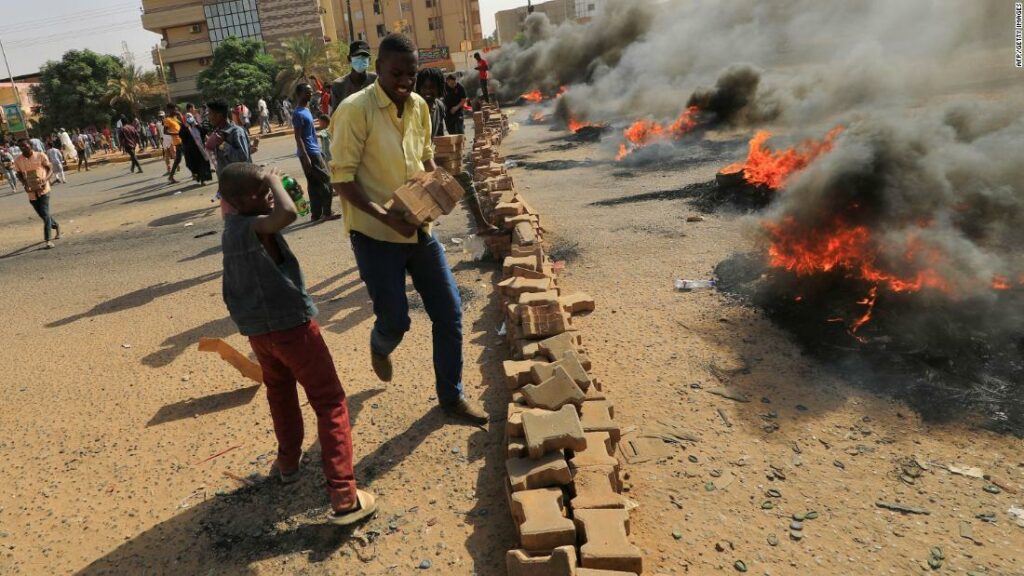The military has taken over Sudan. Here’s what happened

The move has crushed hopes for a peaceful transition of power following the ousting of former President Omar al-Bashir in 2019.Here’s what you need to know:What’s going on in Sudan?Sudan had been ruled by an uneasy alliance between the military and civilian groups since 2019, but on Monday, the military effectively took control. Prime Minister Abdalla Hamdok and his wife were detained and taken to an undisclosed location. Multiple government ministers and officials were also arrested.General Abdel Fattah al-Burhan, the head of Sudan’s armed forces, dissolved the power-sharing Sovereign Council and transitional government, saying in a televised statement that an “independent and fair representative government” would assume power until one is elected in 2023.
How we got here: key dates
January 1, 1956
Sudan gains independence after an agreement between the UK and Egypt.
March 27, 1972
Seventeen years of civil war between northern Khartoum forces and southern Anya-Nya rebels ends.
June 30, 1989
Lt. Gen. Omar al-Bashir leads a coup against Sudan’s Prime Minister Sadiq al-Mahdi following years of civil war.
October 16, 1993
Bashir becomes president of Sudan when the Revolutionary Command Council is dissolved and Sudan is restored to civilian rule.
February 2003
Violence erupts in Darfur. Estimated 300,000 people are killed in the conflict between 2–3 and 2008, according to the UN.
9 January, 2005
A peace agreement between the north and the south includes independence for southern Sudan within six years.
4 March 2009
The International Criminal Court (ICC) in the Hague issues an arrest warrant for Bashir on charges of genocide and war crimes related to the military campaign in Darfur between 2003 and 2008.
July 9, 2011
South Sudan becomes an independent nation.
February 22, 2019
Bashir declares a year-long state of emergency in response to months of protests nationwide and calls for his resignation.
April 11, 2019
Bashir is ousted in a military coup.
June 3, 2019
Troops attack pro-democracy demonstrators in Khartoum, killing at least 100 people.
July 5, 2019
Sudan’s military leadership and the country’s pro-democracy movement announce a power-sharing agreement. A new government is led by Prime Minister Abdalla Hamdok.
December 2019
Bashir is sentenced to two years in a correctional facility after being found guilty of corruption and illegitimate possession of foreign currency.
July 21, 2020
Bashir’s trial over his role in the 1989 coup d’etat starts.
August 11, 2021
The Sudanese government says it will hand Bashir over to the ICC.
September 21, 2021
A coup attempt attributed to Bashir’s supporters fails.
October 25, 2021
The military dissolves Sudan’s ruling council and transitional government and declares a state of emergency. Hamdok is arrested.
Sources: The International Criminal Court
He said the power-sharing agreement with civilian members of the country’s transitional sovereign council “became a conflict” over the past two years, “threatening peace and unity” in Sudan.Several articles of the constitution have been suspended and state governors removed, Burhan said.How did the current troubles start?When Bashir was ousted in a 2019 coup, after three decades in power, Sudan’s military leadership assumed control to oversee the transition of power, forming the Transitional Military Council. But the council was strongly opposed by a pro-democracy movement which called instead for civilian rule. After a weeks-long standoff, the two sides agreed to form a Sovereign Council that would govern “for the next three years or a little longer.”Under the agreement struck in July 2019, the military council would be in charge of the country’s leadership for the first 21 months. A civilian administration would then rule the council over the following 18 months.Did the coup come as a surprise? Not entirely. Adam Hireika, an aide to Hamdok, told CNN the premier was aware of the army’s plans and had been under pressure to dissolve the government.Hireika said he visited Hamdok on Sunday evening where he discussed the current state of affairs. He said Hamdok had just met with Burhan.On Monday, the Information Ministry said Hamdok had been under pressure to release a statement “in support of the takeover.” Instead, it said, he called on pro-democracy protestors take to the streets in peaceful protest.Why is it happening?Tensions had been rising after some politicians, including Hamdok, pushed for a full transition to civilian rule by November 17, in keeping with the original transitional agreement.The situation escalated last month, when a military coup d’etat Videos on social media showed crowds of people making their way towards the military’s General Command. Some could be seen removing razor wire that had been placed across a road amid reports of street closures in several parts of the city. Supporters of civilian rule have also announced a program of civil disobedience and a strike in response to the military takeover, the Ministry of Information said on Facebook. Where is Omar al-Bashir?The chief prosecutor at the International Criminal Court (ICC) in the Hague issued arrest warrants in 2009 and 2010 for Bashir on charges of genocide and war crimes related to Sudan’s military campaign in Darfur between 2003 and 2008.Earlier this year the government announced it would hand the former president over to the ICC, along with other officials wanted over the Darfur conflict.The former president is currently in prison in Sudan; he was sentenced to two years for corruption and illegitimate possession of foreign currency in 2019. He also faces another trial in Sudan over his role in the 1989 coup which brought him to power. CNN’s Ivana Kottasová wrote from London. CNN’s Yassir Abdullah, Kareem Khadder, Hamdi Alkhshali, Kareem El Damanhoury, Mostafa Salem, Jennifer Deaton, Eliza Mackintosh, Nima Elbagir and Kara Fox contributed reporting.




